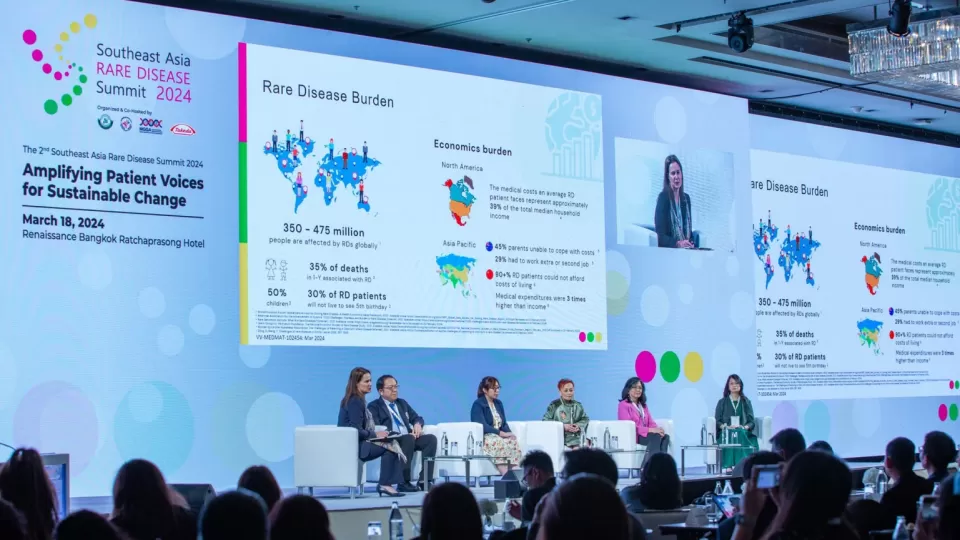March 22, 2024
BANGKOK – The Medical Association of Thailand, under the Royal Patronage, Thai Rare Disease Foundation, and Medical Genetics and Genomics Association joined hands with Takeda (Thailand) Limited to host the second Southeast Asia Rare Disease Summit in Bangkok under the theme “Amplifying Patients Voices for Sustainable Change” to address the complex challenges posed by rare disease and ensure improvement for patients.
At the summit, the region-wide healthcare experts, policymakers, patient advocacy groups and caregiver representatives gathered to discuss the unmet needs, exchange experiences and lay down a strategy to improve diagnosis, access to treatment, and health equity as well as enhance patient empowerment.
This platform supports the rare disease community with the opportunity to share insights, exchange ideas, and pool our collective expertise to address the challenges facing individuals and families affected by rare diseases.
Dr Cholnan Srikaew, Thailand’s Minister of Public Health, affirmed the government’s commitment to enhancing healthcare comprehensively, ensuring universal access and launching projects for easier treatment access. Rare diseases are a priority, with hospitals nationwide trained for efficient screening. At-risk groups will coordinate with the ‘Rare Disease Center’ in 7 network hospitals. The Ministry expanded screening benefits for metabolic genetic diseases in newborns, enabling swift treatment within 24-72 hours. The second Southeast Asia Rare Disease Summit fosters collaboration, learning, and community empowerment, aiming for proactive roles in healthcare policy and treatment access, leading to improved health outcomes and an equitable healthcare
Assoc. Prof. Dr Cherdchai Tontisirin, Vice Minister of Public Health said “Some medical conditions of rare disease are so rare that they can affect as few as one in three million people – and often, there are no viable treatment options. For patients living with rare diseases, this results in a wide set of challenges that starts with the diagnostic journey, with the average patient waiting for around four years before receiving an accurate diagnosis. The rare disease community, hence, endeavours to bring about concrete changes and pursue healthcare equity.”
Professor Thanyachai Sura M.D., President of APSHG and MGGA, emphasized that rare disease diagnosis is often delayed due to time-consuming processes, lower awareness, disease complexity, and limited lab tests. This delay can span 5-10 years, leading to severe impacts on patients, families, and caregivers. High treatment costs and unavailability worsen the situation. Stakeholders must ensure equal access to diagnosis and treatment, prioritizing rare diseases in healthcare systems for improved quality of life, healthcare, and economic outcomes. Collaboration between public and private sectors is crucial for raising awareness, enhancing understanding, and improving patient outcomes, with government support being essential for policy-driven initiatives addressing rare disease healthcare needs.
Patient empowerment and public-private collaboration are key to policy change.
In addition, both public and private sectors join hands to push for appropriate and fair health policies to elevate Thailand’s public healthcare system in the long run. There are a few patient advocacy groups established in Thailand for rare diseases. This coalition plays a crucial role in championing the rights, needs, and interests of individuals living with rare conditions who facing healthcare challenges. With this empowerment, we can ensure that the patient’s voice is heard, valued, and amplified in all aspects of healthcare policy, practice, and research.
Peter Streibl, General Manager of Takeda Thailand, highlighted Takeda’s commitment to the rare disease community, including awareness raising, medical advancements, and amplifying patient voices. Collaboration among public stakeholders, healthcare communities, and patients is crucial for developing equitable access policies and solutions. The Second Southeast Asia Rare Disease Summit will enhance its role as a platform for dialogue, focusing on patient empowerment and policy development. Takeda will continue collaborating with partners to advance the standard of care for Thai patients.
Following the resounding success of the first Southeast Asia Rare Disease Summit where more than 500 participants from around the globe from Asia, Europe, the USA, Canada, Latin America, and the Middle East joined to discuss the topic of how the equality of access to healthcare can usher the community into a sustainable success. Building upon the achievements of the first year, the second edition aims to further elevate the discourse and provide better patient outcomes that will shape the future of the rare disease community.


